Exploring the Impact of COVID-19 on Student Mental Health in England
VerifiedAdded on 2023/06/12
|9
|2825
|476
Report
AI Summary
This report investigates the impact of the COVID-19 pandemic on student mental health in England, highlighting the rise of issues such as anxiety, depression, and social isolation due to restrictions and disruptions in academic and social life. The methodology involved a review of existing literature from journals, articles, and websites to gather qualitative data on the subject. The findings indicate a significant negative effect on students' well-being, affecting their academic performance, lifestyle, and overall quality of life. The conclusion emphasizes the need for measures to mitigate these negative impacts and promote positive mental health strategies for students, recommending further research and the use of diverse resources to address the issue effectively. This assignment solution is available on Desklib, a platform offering a range of study tools and resources for students.
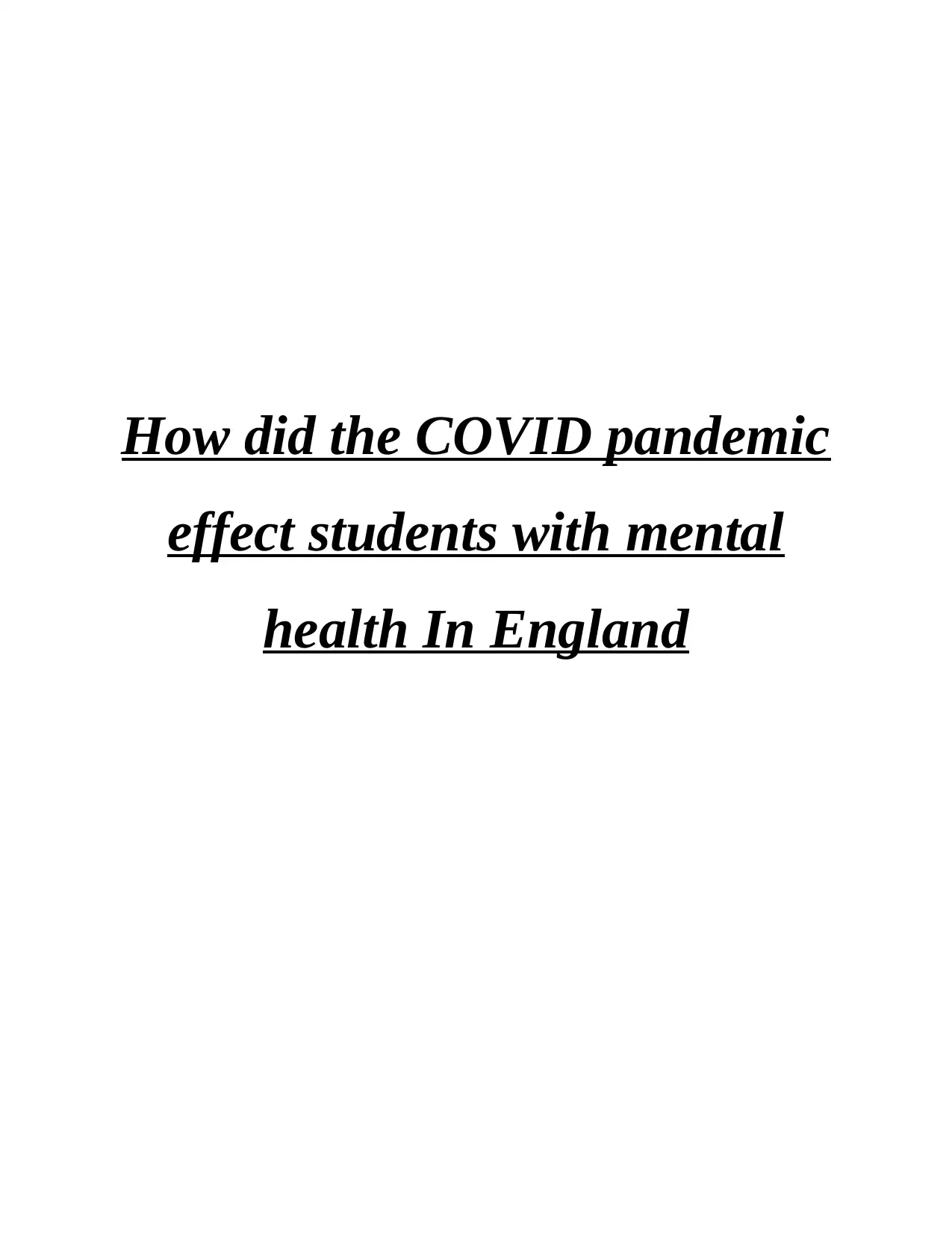
How did the COVID pandemic
effect students with mental
health In England
effect students with mental
health In England
Paraphrase This Document
Need a fresh take? Get an instant paraphrase of this document with our AI Paraphraser
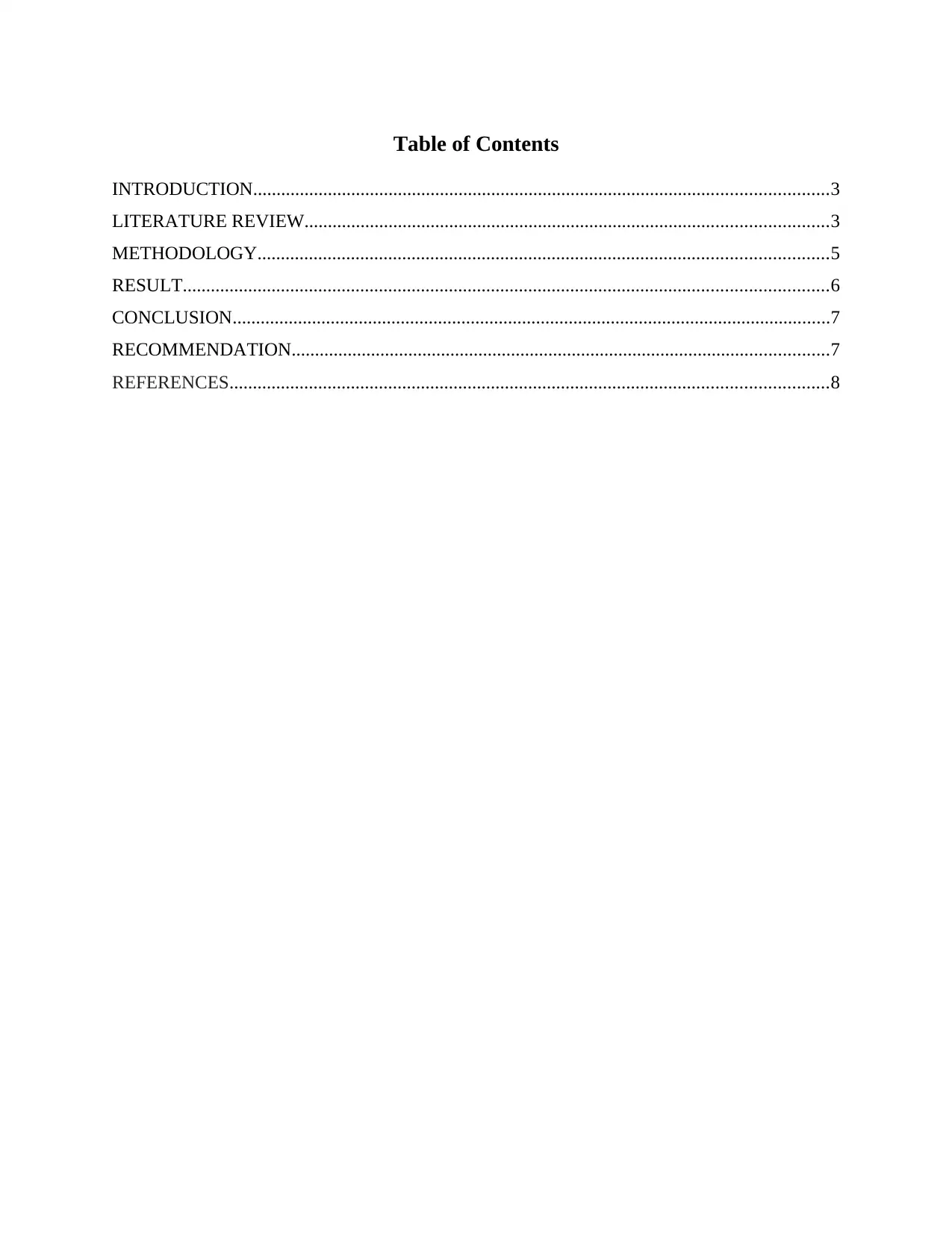
Table of Contents
INTRODUCTION...........................................................................................................................3
LITERATURE REVIEW................................................................................................................3
METHODOLOGY..........................................................................................................................5
RESULT..........................................................................................................................................6
CONCLUSION................................................................................................................................7
RECOMMENDATION...................................................................................................................7
REFERENCES................................................................................................................................8
INTRODUCTION...........................................................................................................................3
LITERATURE REVIEW................................................................................................................3
METHODOLOGY..........................................................................................................................5
RESULT..........................................................................................................................................6
CONCLUSION................................................................................................................................7
RECOMMENDATION...................................................................................................................7
REFERENCES................................................................................................................................8
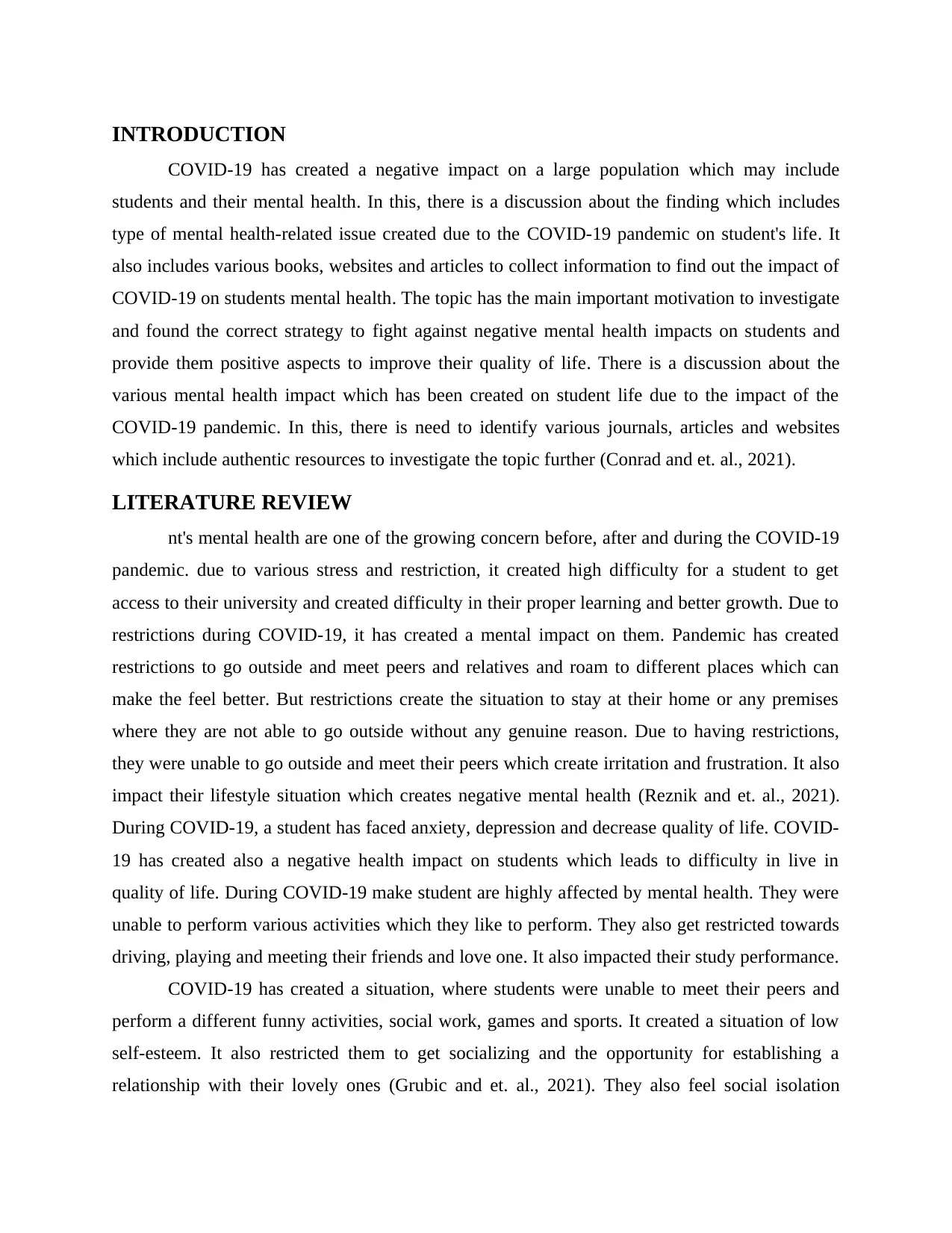
INTRODUCTION
COVID-19 has created a negative impact on a large population which may include
students and their mental health. In this, there is a discussion about the finding which includes
type of mental health-related issue created due to the COVID-19 pandemic on student's life. It
also includes various books, websites and articles to collect information to find out the impact of
COVID-19 on students mental health. The topic has the main important motivation to investigate
and found the correct strategy to fight against negative mental health impacts on students and
provide them positive aspects to improve their quality of life. There is a discussion about the
various mental health impact which has been created on student life due to the impact of the
COVID-19 pandemic. In this, there is need to identify various journals, articles and websites
which include authentic resources to investigate the topic further (Conrad and et. al., 2021).
LITERATURE REVIEW
nt's mental health are one of the growing concern before, after and during the COVID-19
pandemic. due to various stress and restriction, it created high difficulty for a student to get
access to their university and created difficulty in their proper learning and better growth. Due to
restrictions during COVID-19, it has created a mental impact on them. Pandemic has created
restrictions to go outside and meet peers and relatives and roam to different places which can
make the feel better. But restrictions create the situation to stay at their home or any premises
where they are not able to go outside without any genuine reason. Due to having restrictions,
they were unable to go outside and meet their peers which create irritation and frustration. It also
impact their lifestyle situation which creates negative mental health (Reznik and et. al., 2021).
During COVID-19, a student has faced anxiety, depression and decrease quality of life. COVID-
19 has created also a negative health impact on students which leads to difficulty in live in
quality of life. During COVID-19 make student are highly affected by mental health. They were
unable to perform various activities which they like to perform. They also get restricted towards
driving, playing and meeting their friends and love one. It also impacted their study performance.
COVID-19 has created a situation, where students were unable to meet their peers and
perform a different funny activities, social work, games and sports. It created a situation of low
self-esteem. It also restricted them to get socializing and the opportunity for establishing a
relationship with their lovely ones (Grubic and et. al., 2021). They also feel social isolation
COVID-19 has created a negative impact on a large population which may include
students and their mental health. In this, there is a discussion about the finding which includes
type of mental health-related issue created due to the COVID-19 pandemic on student's life. It
also includes various books, websites and articles to collect information to find out the impact of
COVID-19 on students mental health. The topic has the main important motivation to investigate
and found the correct strategy to fight against negative mental health impacts on students and
provide them positive aspects to improve their quality of life. There is a discussion about the
various mental health impact which has been created on student life due to the impact of the
COVID-19 pandemic. In this, there is need to identify various journals, articles and websites
which include authentic resources to investigate the topic further (Conrad and et. al., 2021).
LITERATURE REVIEW
nt's mental health are one of the growing concern before, after and during the COVID-19
pandemic. due to various stress and restriction, it created high difficulty for a student to get
access to their university and created difficulty in their proper learning and better growth. Due to
restrictions during COVID-19, it has created a mental impact on them. Pandemic has created
restrictions to go outside and meet peers and relatives and roam to different places which can
make the feel better. But restrictions create the situation to stay at their home or any premises
where they are not able to go outside without any genuine reason. Due to having restrictions,
they were unable to go outside and meet their peers which create irritation and frustration. It also
impact their lifestyle situation which creates negative mental health (Reznik and et. al., 2021).
During COVID-19, a student has faced anxiety, depression and decrease quality of life. COVID-
19 has created also a negative health impact on students which leads to difficulty in live in
quality of life. During COVID-19 make student are highly affected by mental health. They were
unable to perform various activities which they like to perform. They also get restricted towards
driving, playing and meeting their friends and love one. It also impacted their study performance.
COVID-19 has created a situation, where students were unable to meet their peers and
perform a different funny activities, social work, games and sports. It created a situation of low
self-esteem. It also restricted them to get socializing and the opportunity for establishing a
relationship with their lovely ones (Grubic and et. al., 2021). They also feel social isolation
⊘ This is a preview!⊘
Do you want full access?
Subscribe today to unlock all pages.

Trusted by 1+ million students worldwide
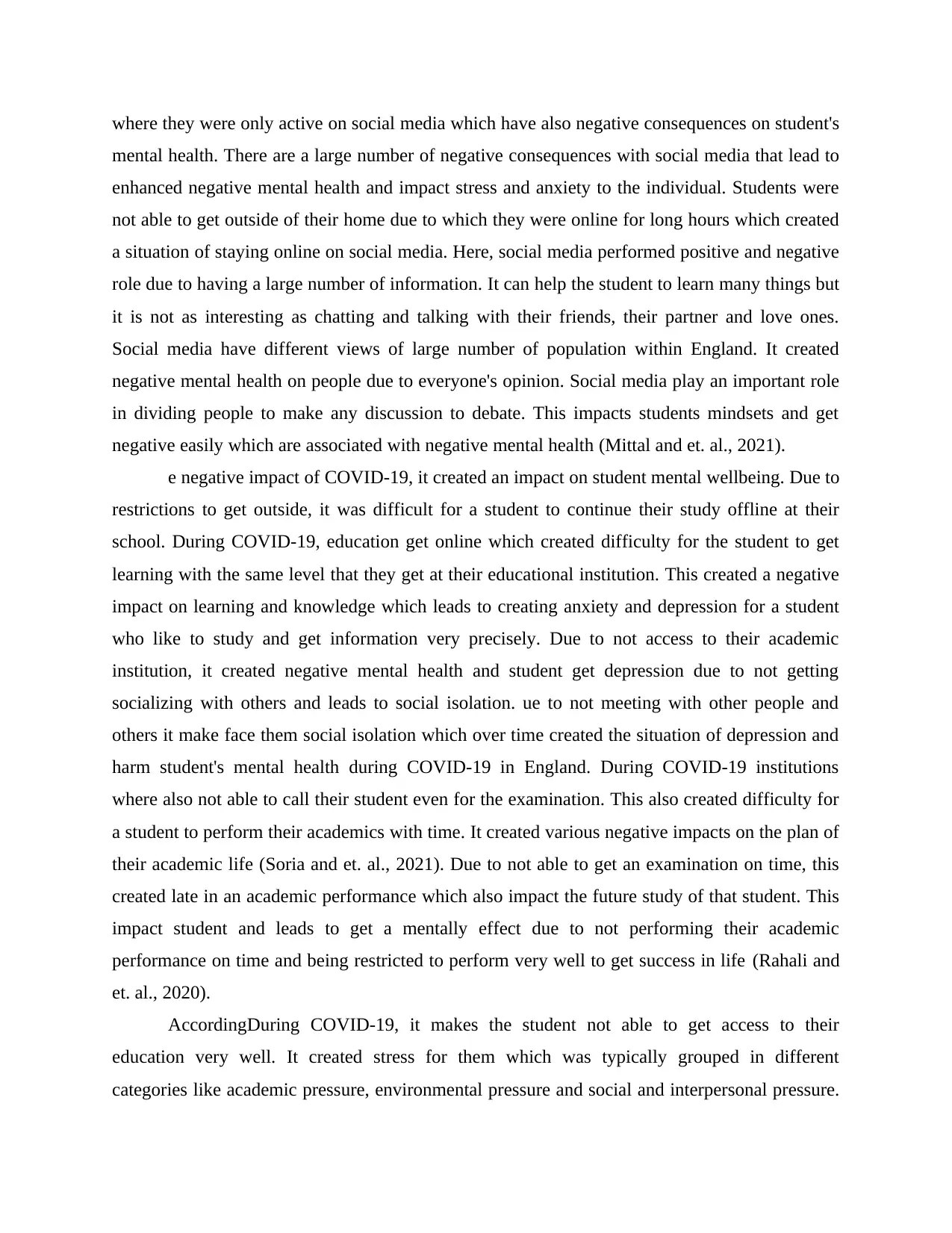
where they were only active on social media which have also negative consequences on student's
mental health. There are a large number of negative consequences with social media that lead to
enhanced negative mental health and impact stress and anxiety to the individual. Students were
not able to get outside of their home due to which they were online for long hours which created
a situation of staying online on social media. Here, social media performed positive and negative
role due to having a large number of information. It can help the student to learn many things but
it is not as interesting as chatting and talking with their friends, their partner and love ones.
Social media have different views of large number of population within England. It created
negative mental health on people due to everyone's opinion. Social media play an important role
in dividing people to make any discussion to debate. This impacts students mindsets and get
negative easily which are associated with negative mental health (Mittal and et. al., 2021).
e negative impact of COVID-19, it created an impact on student mental wellbeing. Due to
restrictions to get outside, it was difficult for a student to continue their study offline at their
school. During COVID-19, education get online which created difficulty for the student to get
learning with the same level that they get at their educational institution. This created a negative
impact on learning and knowledge which leads to creating anxiety and depression for a student
who like to study and get information very precisely. Due to not access to their academic
institution, it created negative mental health and student get depression due to not getting
socializing with others and leads to social isolation. ue to not meeting with other people and
others it make face them social isolation which over time created the situation of depression and
harm student's mental health during COVID-19 in England. During COVID-19 institutions
where also not able to call their student even for the examination. This also created difficulty for
a student to perform their academics with time. It created various negative impacts on the plan of
their academic life (Soria and et. al., 2021). Due to not able to get an examination on time, this
created late in an academic performance which also impact the future study of that student. This
impact student and leads to get a mentally effect due to not performing their academic
performance on time and being restricted to perform very well to get success in life (Rahali and
et. al., 2020).
AccordingDuring COVID-19, it makes the student not able to get access to their
education very well. It created stress for them which was typically grouped in different
categories like academic pressure, environmental pressure and social and interpersonal pressure.
mental health. There are a large number of negative consequences with social media that lead to
enhanced negative mental health and impact stress and anxiety to the individual. Students were
not able to get outside of their home due to which they were online for long hours which created
a situation of staying online on social media. Here, social media performed positive and negative
role due to having a large number of information. It can help the student to learn many things but
it is not as interesting as chatting and talking with their friends, their partner and love ones.
Social media have different views of large number of population within England. It created
negative mental health on people due to everyone's opinion. Social media play an important role
in dividing people to make any discussion to debate. This impacts students mindsets and get
negative easily which are associated with negative mental health (Mittal and et. al., 2021).
e negative impact of COVID-19, it created an impact on student mental wellbeing. Due to
restrictions to get outside, it was difficult for a student to continue their study offline at their
school. During COVID-19, education get online which created difficulty for the student to get
learning with the same level that they get at their educational institution. This created a negative
impact on learning and knowledge which leads to creating anxiety and depression for a student
who like to study and get information very precisely. Due to not access to their academic
institution, it created negative mental health and student get depression due to not getting
socializing with others and leads to social isolation. ue to not meeting with other people and
others it make face them social isolation which over time created the situation of depression and
harm student's mental health during COVID-19 in England. During COVID-19 institutions
where also not able to call their student even for the examination. This also created difficulty for
a student to perform their academics with time. It created various negative impacts on the plan of
their academic life (Soria and et. al., 2021). Due to not able to get an examination on time, this
created late in an academic performance which also impact the future study of that student. This
impact student and leads to get a mentally effect due to not performing their academic
performance on time and being restricted to perform very well to get success in life (Rahali and
et. al., 2020).
AccordingDuring COVID-19, it makes the student not able to get access to their
education very well. It created stress for them which was typically grouped in different
categories like academic pressure, environmental pressure and social and interpersonal pressure.
Paraphrase This Document
Need a fresh take? Get an instant paraphrase of this document with our AI Paraphraser
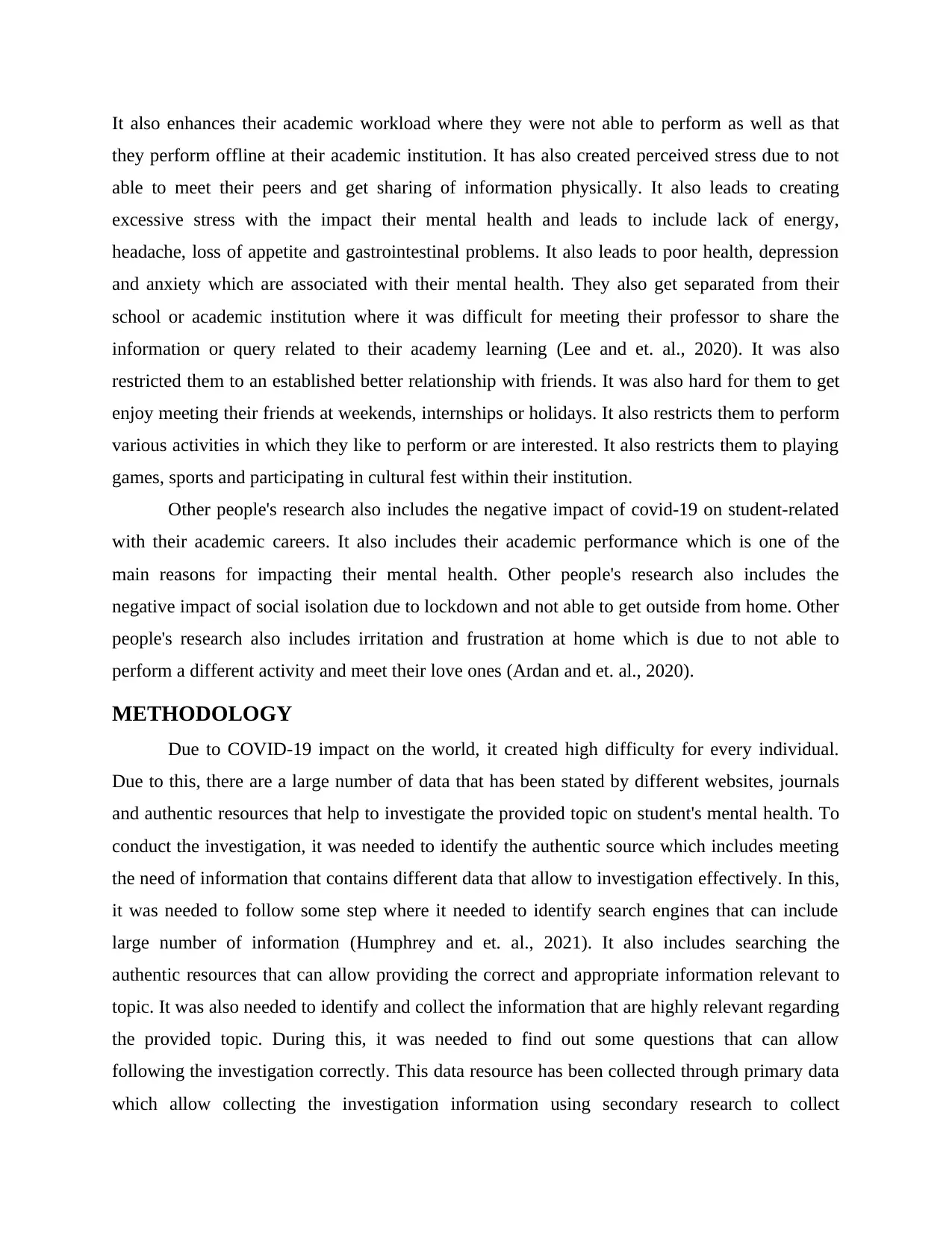
It also enhances their academic workload where they were not able to perform as well as that
they perform offline at their academic institution. It has also created perceived stress due to not
able to meet their peers and get sharing of information physically. It also leads to creating
excessive stress with the impact their mental health and leads to include lack of energy,
headache, loss of appetite and gastrointestinal problems. It also leads to poor health, depression
and anxiety which are associated with their mental health. They also get separated from their
school or academic institution where it was difficult for meeting their professor to share the
information or query related to their academy learning (Lee and et. al., 2020). It was also
restricted them to an established better relationship with friends. It was also hard for them to get
enjoy meeting their friends at weekends, internships or holidays. It also restricts them to perform
various activities in which they like to perform or are interested. It also restricts them to playing
games, sports and participating in cultural fest within their institution.
Other people's research also includes the negative impact of covid-19 on student-related
with their academic careers. It also includes their academic performance which is one of the
main reasons for impacting their mental health. Other people's research also includes the
negative impact of social isolation due to lockdown and not able to get outside from home. Other
people's research also includes irritation and frustration at home which is due to not able to
perform a different activity and meet their love ones (Ardan and et. al., 2020).
METHODOLOGY
Due to COVID-19 impact on the world, it created high difficulty for every individual.
Due to this, there are a large number of data that has been stated by different websites, journals
and authentic resources that help to investigate the provided topic on student's mental health. To
conduct the investigation, it was needed to identify the authentic source which includes meeting
the need of information that contains different data that allow to investigation effectively. In this,
it was needed to follow some step where it needed to identify search engines that can include
large number of information (Humphrey and et. al., 2021). It also includes searching the
authentic resources that can allow providing the correct and appropriate information relevant to
topic. It was also needed to identify and collect the information that are highly relevant regarding
the provided topic. During this, it was needed to find out some questions that can allow
following the investigation correctly. This data resource has been collected through primary data
which allow collecting the investigation information using secondary research to collect
they perform offline at their academic institution. It has also created perceived stress due to not
able to meet their peers and get sharing of information physically. It also leads to creating
excessive stress with the impact their mental health and leads to include lack of energy,
headache, loss of appetite and gastrointestinal problems. It also leads to poor health, depression
and anxiety which are associated with their mental health. They also get separated from their
school or academic institution where it was difficult for meeting their professor to share the
information or query related to their academy learning (Lee and et. al., 2020). It was also
restricted them to an established better relationship with friends. It was also hard for them to get
enjoy meeting their friends at weekends, internships or holidays. It also restricts them to perform
various activities in which they like to perform or are interested. It also restricts them to playing
games, sports and participating in cultural fest within their institution.
Other people's research also includes the negative impact of covid-19 on student-related
with their academic careers. It also includes their academic performance which is one of the
main reasons for impacting their mental health. Other people's research also includes the
negative impact of social isolation due to lockdown and not able to get outside from home. Other
people's research also includes irritation and frustration at home which is due to not able to
perform a different activity and meet their love ones (Ardan and et. al., 2020).
METHODOLOGY
Due to COVID-19 impact on the world, it created high difficulty for every individual.
Due to this, there are a large number of data that has been stated by different websites, journals
and authentic resources that help to investigate the provided topic on student's mental health. To
conduct the investigation, it was needed to identify the authentic source which includes meeting
the need of information that contains different data that allow to investigation effectively. In this,
it was needed to follow some step where it needed to identify search engines that can include
large number of information (Humphrey and et. al., 2021). It also includes searching the
authentic resources that can allow providing the correct and appropriate information relevant to
topic. It was also needed to identify and collect the information that are highly relevant regarding
the provided topic. During this, it was needed to find out some questions that can allow
following the investigation correctly. This data resource has been collected through primary data
which allow collecting the investigation information using secondary research to collect
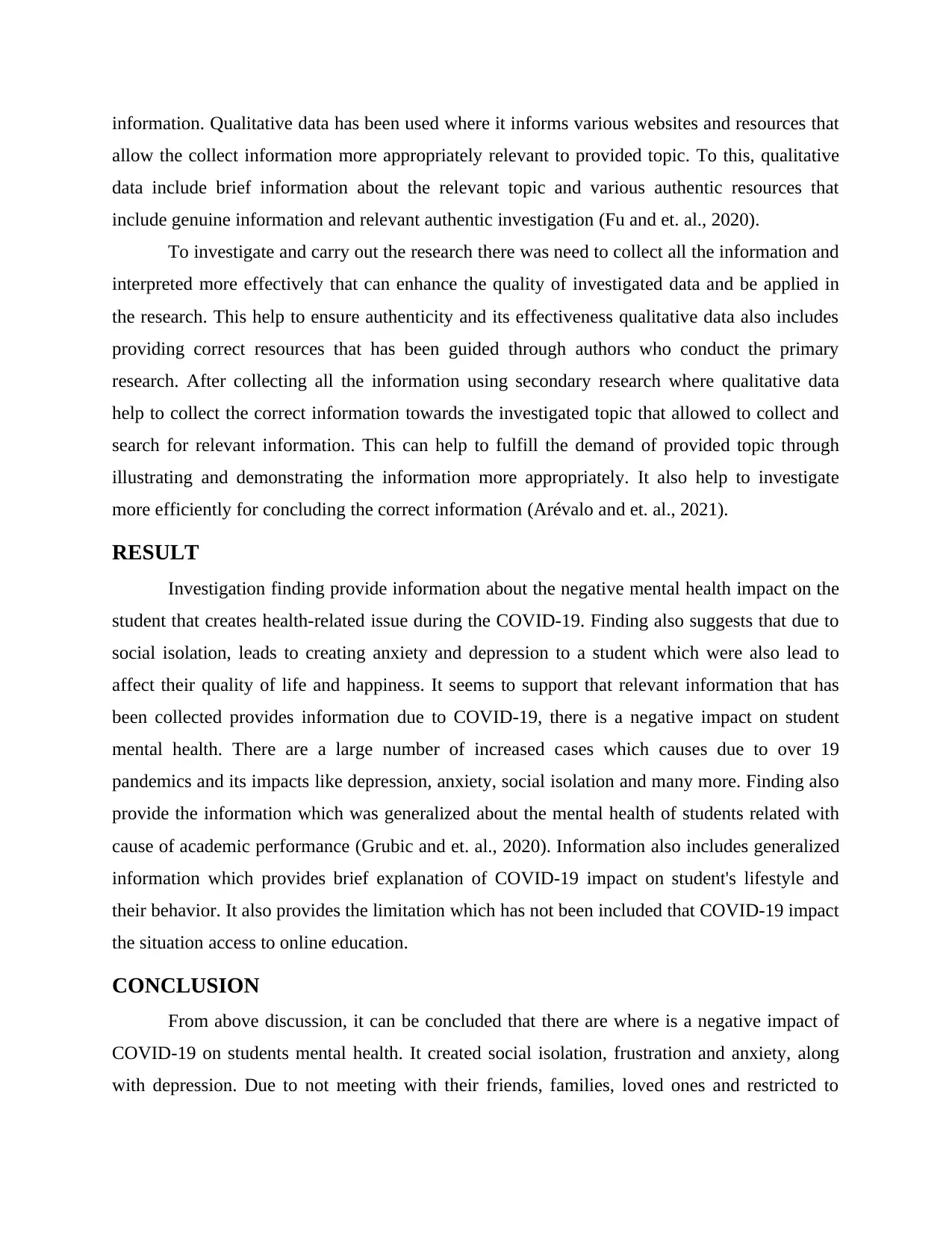
information. Qualitative data has been used where it informs various websites and resources that
allow the collect information more appropriately relevant to provided topic. To this, qualitative
data include brief information about the relevant topic and various authentic resources that
include genuine information and relevant authentic investigation (Fu and et. al., 2020).
To investigate and carry out the research there was need to collect all the information and
interpreted more effectively that can enhance the quality of investigated data and be applied in
the research. This help to ensure authenticity and its effectiveness qualitative data also includes
providing correct resources that has been guided through authors who conduct the primary
research. After collecting all the information using secondary research where qualitative data
help to collect the correct information towards the investigated topic that allowed to collect and
search for relevant information. This can help to fulfill the demand of provided topic through
illustrating and demonstrating the information more appropriately. It also help to investigate
more efficiently for concluding the correct information (Arévalo and et. al., 2021).
RESULT
Investigation finding provide information about the negative mental health impact on the
student that creates health-related issue during the COVID-19. Finding also suggests that due to
social isolation, leads to creating anxiety and depression to a student which were also lead to
affect their quality of life and happiness. It seems to support that relevant information that has
been collected provides information due to COVID-19, there is a negative impact on student
mental health. There are a large number of increased cases which causes due to over 19
pandemics and its impacts like depression, anxiety, social isolation and many more. Finding also
provide the information which was generalized about the mental health of students related with
cause of academic performance (Grubic and et. al., 2020). Information also includes generalized
information which provides brief explanation of COVID-19 impact on student's lifestyle and
their behavior. It also provides the limitation which has not been included that COVID-19 impact
the situation access to online education.
CONCLUSION
From above discussion, it can be concluded that there are where is a negative impact of
COVID-19 on students mental health. It created social isolation, frustration and anxiety, along
with depression. Due to not meeting with their friends, families, loved ones and restricted to
allow the collect information more appropriately relevant to provided topic. To this, qualitative
data include brief information about the relevant topic and various authentic resources that
include genuine information and relevant authentic investigation (Fu and et. al., 2020).
To investigate and carry out the research there was need to collect all the information and
interpreted more effectively that can enhance the quality of investigated data and be applied in
the research. This help to ensure authenticity and its effectiveness qualitative data also includes
providing correct resources that has been guided through authors who conduct the primary
research. After collecting all the information using secondary research where qualitative data
help to collect the correct information towards the investigated topic that allowed to collect and
search for relevant information. This can help to fulfill the demand of provided topic through
illustrating and demonstrating the information more appropriately. It also help to investigate
more efficiently for concluding the correct information (Arévalo and et. al., 2021).
RESULT
Investigation finding provide information about the negative mental health impact on the
student that creates health-related issue during the COVID-19. Finding also suggests that due to
social isolation, leads to creating anxiety and depression to a student which were also lead to
affect their quality of life and happiness. It seems to support that relevant information that has
been collected provides information due to COVID-19, there is a negative impact on student
mental health. There are a large number of increased cases which causes due to over 19
pandemics and its impacts like depression, anxiety, social isolation and many more. Finding also
provide the information which was generalized about the mental health of students related with
cause of academic performance (Grubic and et. al., 2020). Information also includes generalized
information which provides brief explanation of COVID-19 impact on student's lifestyle and
their behavior. It also provides the limitation which has not been included that COVID-19 impact
the situation access to online education.
CONCLUSION
From above discussion, it can be concluded that there are where is a negative impact of
COVID-19 on students mental health. It created social isolation, frustration and anxiety, along
with depression. Due to not meeting with their friends, families, loved ones and restricted to
⊘ This is a preview!⊘
Do you want full access?
Subscribe today to unlock all pages.

Trusted by 1+ million students worldwide
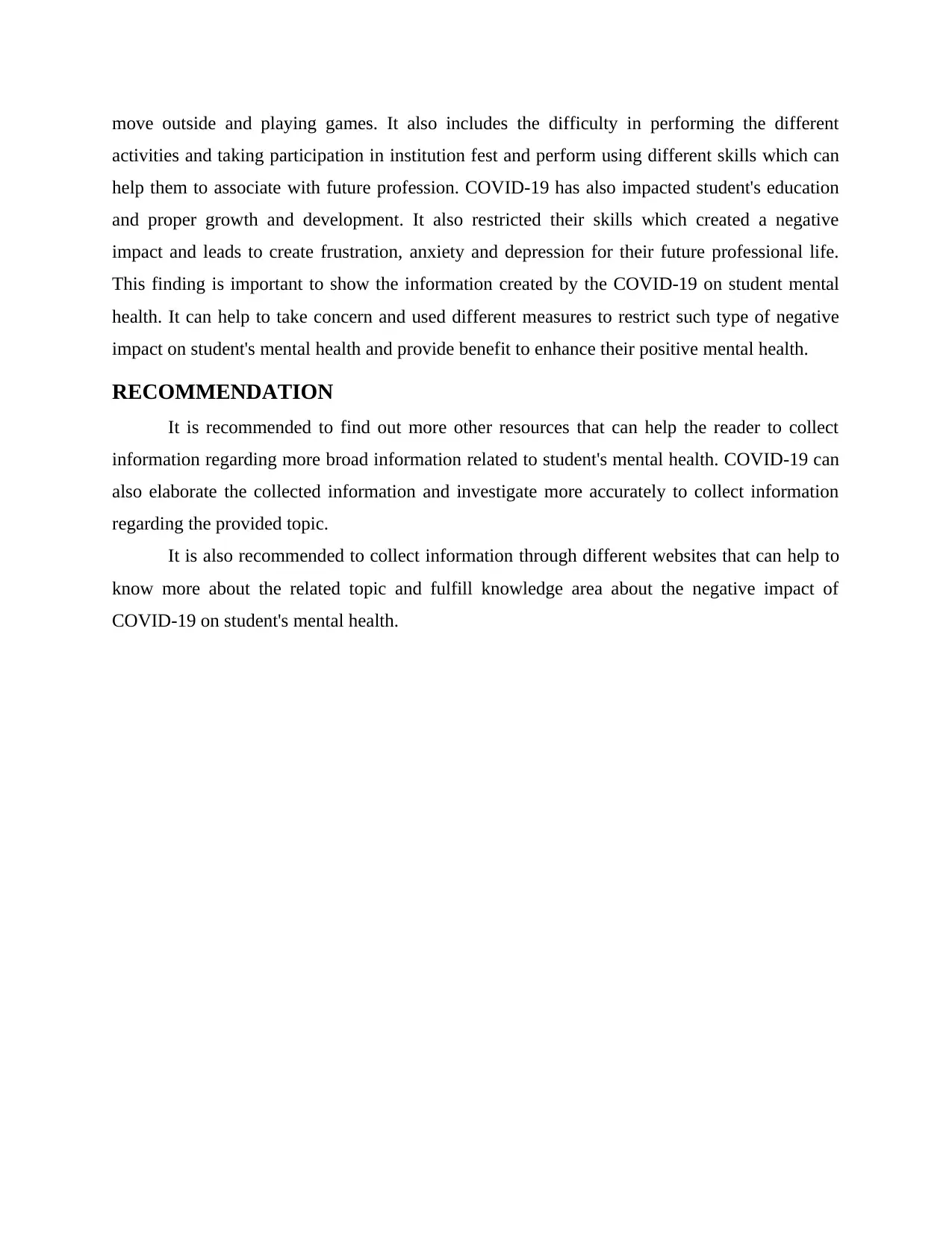
move outside and playing games. It also includes the difficulty in performing the different
activities and taking participation in institution fest and perform using different skills which can
help them to associate with future profession. COVID-19 has also impacted student's education
and proper growth and development. It also restricted their skills which created a negative
impact and leads to create frustration, anxiety and depression for their future professional life.
This finding is important to show the information created by the COVID-19 on student mental
health. It can help to take concern and used different measures to restrict such type of negative
impact on student's mental health and provide benefit to enhance their positive mental health.
RECOMMENDATION
It is recommended to find out more other resources that can help the reader to collect
information regarding more broad information related to student's mental health. COVID-19 can
also elaborate the collected information and investigate more accurately to collect information
regarding the provided topic.
It is also recommended to collect information through different websites that can help to
know more about the related topic and fulfill knowledge area about the negative impact of
COVID-19 on student's mental health.
activities and taking participation in institution fest and perform using different skills which can
help them to associate with future profession. COVID-19 has also impacted student's education
and proper growth and development. It also restricted their skills which created a negative
impact and leads to create frustration, anxiety and depression for their future professional life.
This finding is important to show the information created by the COVID-19 on student mental
health. It can help to take concern and used different measures to restrict such type of negative
impact on student's mental health and provide benefit to enhance their positive mental health.
RECOMMENDATION
It is recommended to find out more other resources that can help the reader to collect
information regarding more broad information related to student's mental health. COVID-19 can
also elaborate the collected information and investigate more accurately to collect information
regarding the provided topic.
It is also recommended to collect information through different websites that can help to
know more about the related topic and fulfill knowledge area about the negative impact of
COVID-19 on student's mental health.
Paraphrase This Document
Need a fresh take? Get an instant paraphrase of this document with our AI Paraphraser
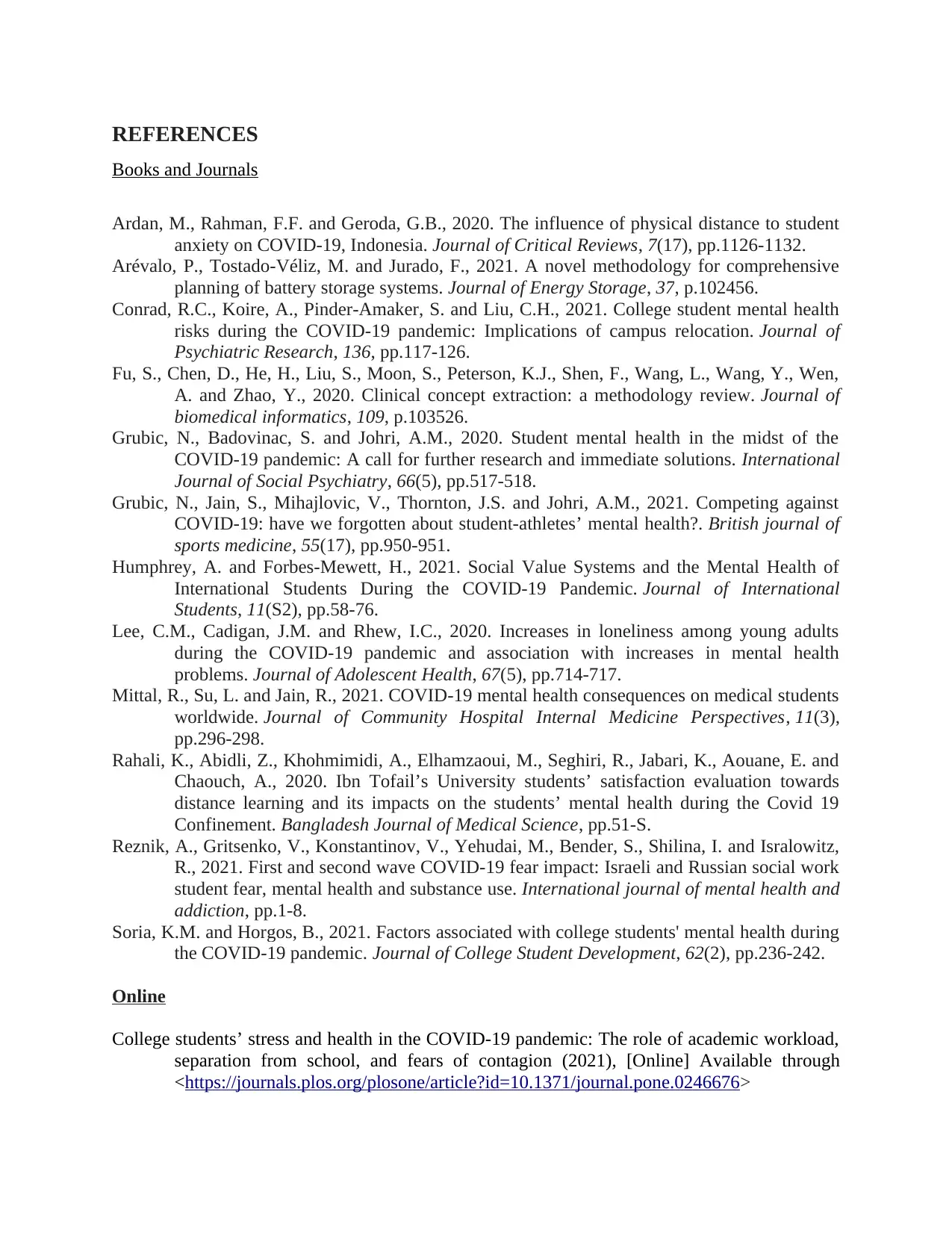
REFERENCES
Books and Journals
Ardan, M., Rahman, F.F. and Geroda, G.B., 2020. The influence of physical distance to student
anxiety on COVID-19, Indonesia. Journal of Critical Reviews, 7(17), pp.1126-1132.
Arévalo, P., Tostado-Véliz, M. and Jurado, F., 2021. A novel methodology for comprehensive
planning of battery storage systems. Journal of Energy Storage, 37, p.102456.
Conrad, R.C., Koire, A., Pinder-Amaker, S. and Liu, C.H., 2021. College student mental health
risks during the COVID-19 pandemic: Implications of campus relocation. Journal of
Psychiatric Research, 136, pp.117-126.
Fu, S., Chen, D., He, H., Liu, S., Moon, S., Peterson, K.J., Shen, F., Wang, L., Wang, Y., Wen,
A. and Zhao, Y., 2020. Clinical concept extraction: a methodology review. Journal of
biomedical informatics, 109, p.103526.
Grubic, N., Badovinac, S. and Johri, A.M., 2020. Student mental health in the midst of the
COVID-19 pandemic: A call for further research and immediate solutions. International
Journal of Social Psychiatry, 66(5), pp.517-518.
Grubic, N., Jain, S., Mihajlovic, V., Thornton, J.S. and Johri, A.M., 2021. Competing against
COVID-19: have we forgotten about student-athletes’ mental health?. British journal of
sports medicine, 55(17), pp.950-951.
Humphrey, A. and Forbes-Mewett, H., 2021. Social Value Systems and the Mental Health of
International Students During the COVID-19 Pandemic. Journal of International
Students, 11(S2), pp.58-76.
Lee, C.M., Cadigan, J.M. and Rhew, I.C., 2020. Increases in loneliness among young adults
during the COVID-19 pandemic and association with increases in mental health
problems. Journal of Adolescent Health, 67(5), pp.714-717.
Mittal, R., Su, L. and Jain, R., 2021. COVID-19 mental health consequences on medical students
worldwide. Journal of Community Hospital Internal Medicine Perspectives, 11(3),
pp.296-298.
Rahali, K., Abidli, Z., Khohmimidi, A., Elhamzaoui, M., Seghiri, R., Jabari, K., Aouane, E. and
Chaouch, A., 2020. Ibn Tofail’s University students’ satisfaction evaluation towards
distance learning and its impacts on the students’ mental health during the Covid 19
Confinement. Bangladesh Journal of Medical Science, pp.51-S.
Reznik, A., Gritsenko, V., Konstantinov, V., Yehudai, M., Bender, S., Shilina, I. and Isralowitz,
R., 2021. First and second wave COVID-19 fear impact: Israeli and Russian social work
student fear, mental health and substance use. International journal of mental health and
addiction, pp.1-8.
Soria, K.M. and Horgos, B., 2021. Factors associated with college students' mental health during
the COVID-19 pandemic. Journal of College Student Development, 62(2), pp.236-242.
Online
College students’ stress and health in the COVID-19 pandemic: The role of academic workload,
separation from school, and fears of contagion (2021), [Online] Available through
<https://journals.plos.org/plosone/article?id=10.1371/journal.pone.0246676>
Books and Journals
Ardan, M., Rahman, F.F. and Geroda, G.B., 2020. The influence of physical distance to student
anxiety on COVID-19, Indonesia. Journal of Critical Reviews, 7(17), pp.1126-1132.
Arévalo, P., Tostado-Véliz, M. and Jurado, F., 2021. A novel methodology for comprehensive
planning of battery storage systems. Journal of Energy Storage, 37, p.102456.
Conrad, R.C., Koire, A., Pinder-Amaker, S. and Liu, C.H., 2021. College student mental health
risks during the COVID-19 pandemic: Implications of campus relocation. Journal of
Psychiatric Research, 136, pp.117-126.
Fu, S., Chen, D., He, H., Liu, S., Moon, S., Peterson, K.J., Shen, F., Wang, L., Wang, Y., Wen,
A. and Zhao, Y., 2020. Clinical concept extraction: a methodology review. Journal of
biomedical informatics, 109, p.103526.
Grubic, N., Badovinac, S. and Johri, A.M., 2020. Student mental health in the midst of the
COVID-19 pandemic: A call for further research and immediate solutions. International
Journal of Social Psychiatry, 66(5), pp.517-518.
Grubic, N., Jain, S., Mihajlovic, V., Thornton, J.S. and Johri, A.M., 2021. Competing against
COVID-19: have we forgotten about student-athletes’ mental health?. British journal of
sports medicine, 55(17), pp.950-951.
Humphrey, A. and Forbes-Mewett, H., 2021. Social Value Systems and the Mental Health of
International Students During the COVID-19 Pandemic. Journal of International
Students, 11(S2), pp.58-76.
Lee, C.M., Cadigan, J.M. and Rhew, I.C., 2020. Increases in loneliness among young adults
during the COVID-19 pandemic and association with increases in mental health
problems. Journal of Adolescent Health, 67(5), pp.714-717.
Mittal, R., Su, L. and Jain, R., 2021. COVID-19 mental health consequences on medical students
worldwide. Journal of Community Hospital Internal Medicine Perspectives, 11(3),
pp.296-298.
Rahali, K., Abidli, Z., Khohmimidi, A., Elhamzaoui, M., Seghiri, R., Jabari, K., Aouane, E. and
Chaouch, A., 2020. Ibn Tofail’s University students’ satisfaction evaluation towards
distance learning and its impacts on the students’ mental health during the Covid 19
Confinement. Bangladesh Journal of Medical Science, pp.51-S.
Reznik, A., Gritsenko, V., Konstantinov, V., Yehudai, M., Bender, S., Shilina, I. and Isralowitz,
R., 2021. First and second wave COVID-19 fear impact: Israeli and Russian social work
student fear, mental health and substance use. International journal of mental health and
addiction, pp.1-8.
Soria, K.M. and Horgos, B., 2021. Factors associated with college students' mental health during
the COVID-19 pandemic. Journal of College Student Development, 62(2), pp.236-242.
Online
College students’ stress and health in the COVID-19 pandemic: The role of academic workload,
separation from school, and fears of contagion (2021), [Online] Available through
<https://journals.plos.org/plosone/article?id=10.1371/journal.pone.0246676>
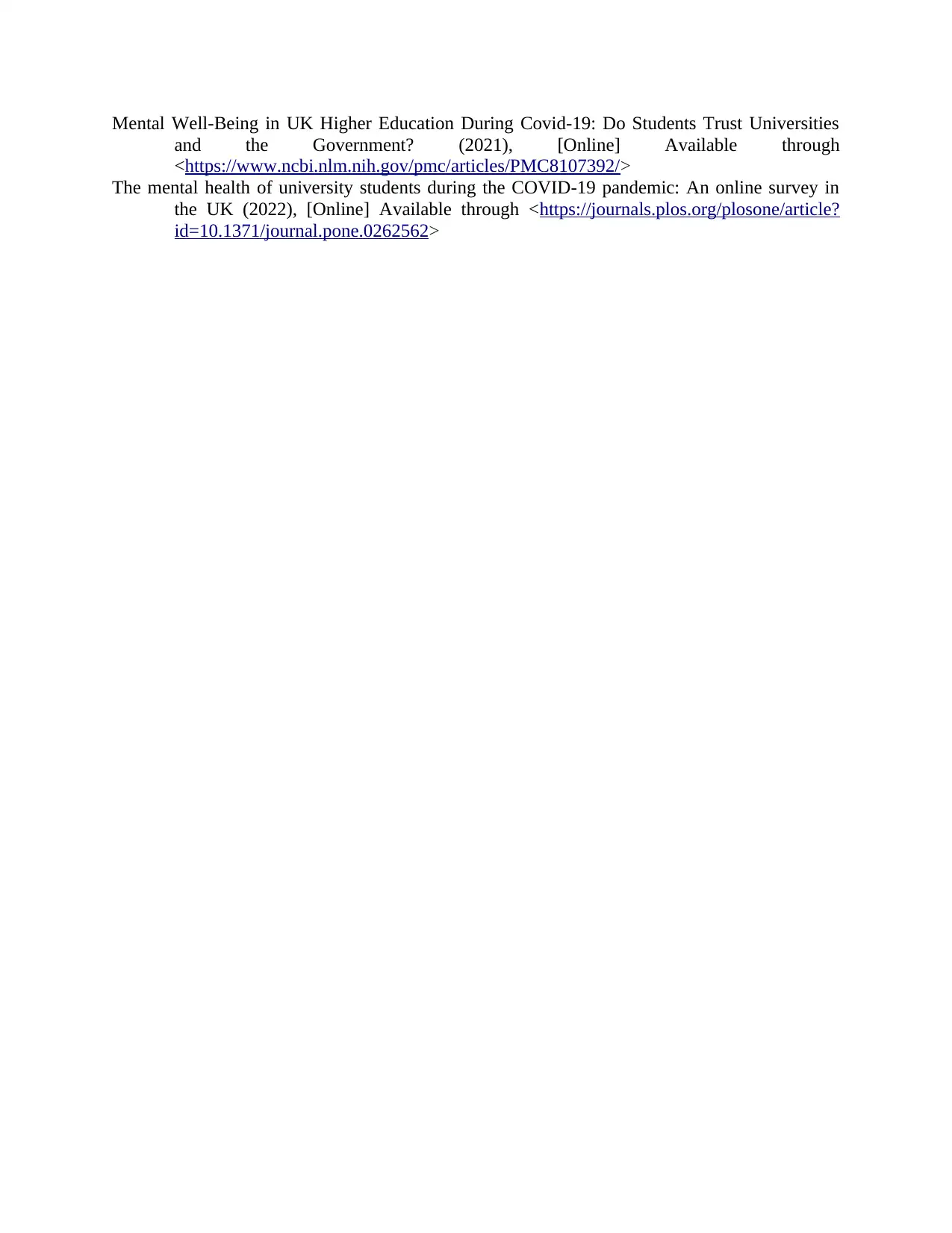
Mental Well-Being in UK Higher Education During Covid-19: Do Students Trust Universities
and the Government? (2021), [Online] Available through
<https://www.ncbi.nlm.nih.gov/pmc/articles/PMC8107392/>
The mental health of university students during the COVID-19 pandemic: An online survey in
the UK (2022), [Online] Available through <https://journals.plos.org/plosone/article?
id=10.1371/journal.pone.0262562>
and the Government? (2021), [Online] Available through
<https://www.ncbi.nlm.nih.gov/pmc/articles/PMC8107392/>
The mental health of university students during the COVID-19 pandemic: An online survey in
the UK (2022), [Online] Available through <https://journals.plos.org/plosone/article?
id=10.1371/journal.pone.0262562>
⊘ This is a preview!⊘
Do you want full access?
Subscribe today to unlock all pages.

Trusted by 1+ million students worldwide
1 out of 9
Related Documents
Your All-in-One AI-Powered Toolkit for Academic Success.
+13062052269
info@desklib.com
Available 24*7 on WhatsApp / Email
![[object Object]](/_next/static/media/star-bottom.7253800d.svg)
Unlock your academic potential
Copyright © 2020–2025 A2Z Services. All Rights Reserved. Developed and managed by ZUCOL.



